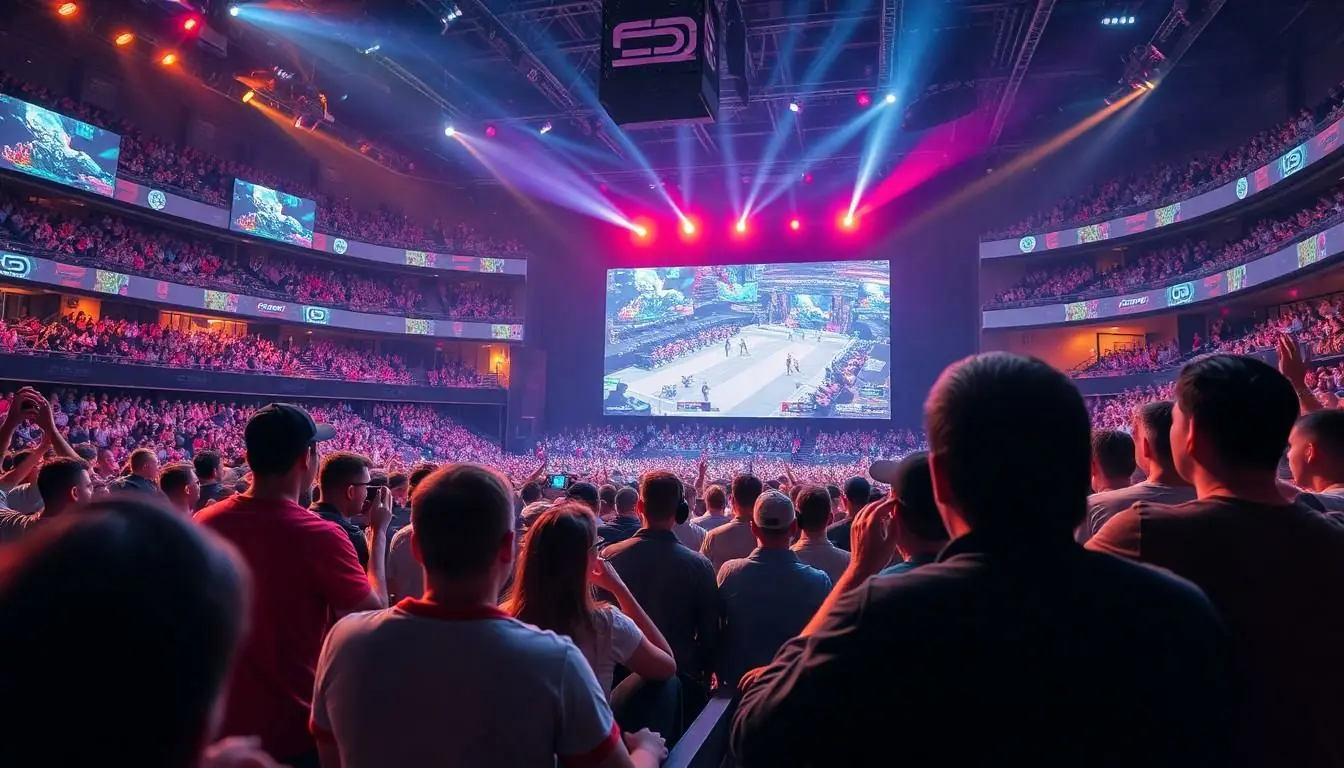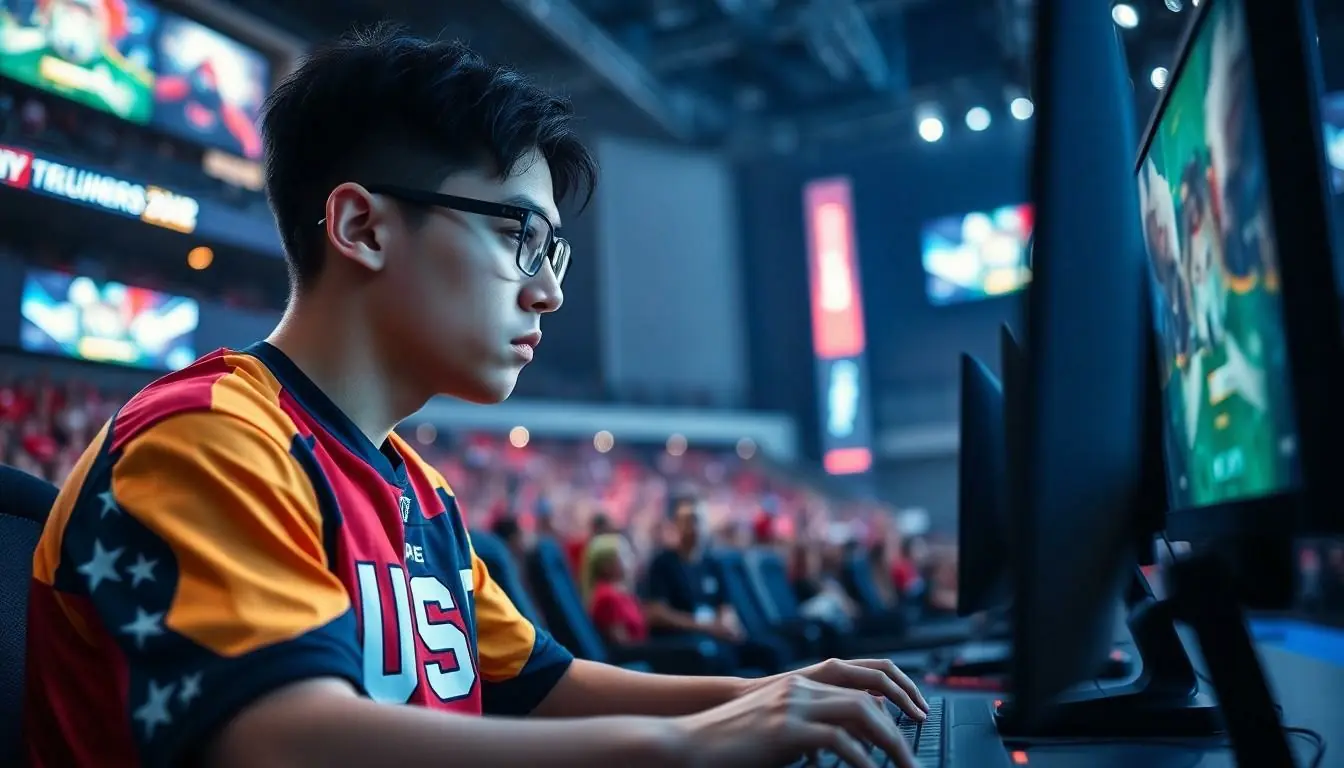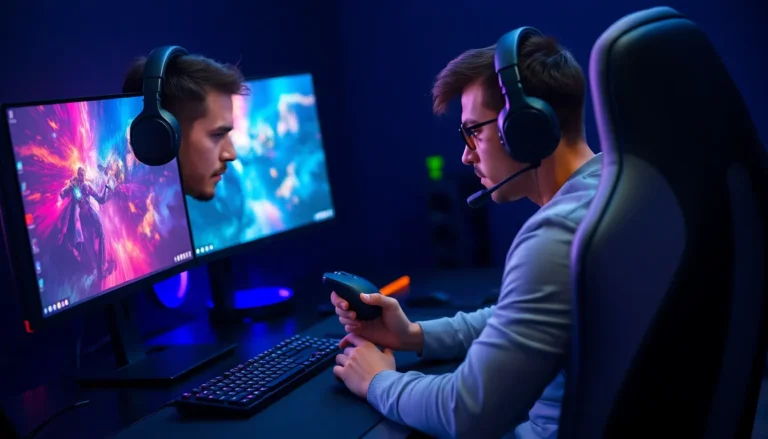As the world gears up for the next Olympic Games, a new contender is making waves in the sports arena—esports. Imagine athletes trading in their running shoes for gaming headsets, competing not just for glory but for gold medals. It’s a digital showdown where reflexes are as sharp as a sprinter’s sprint, and strategy is as crucial as any gymnastic routine.
With millions glued to their screens, esports has transformed from a niche hobby to a global phenomenon. The question isn’t whether esports belongs in the Olympics, but how it’ll redefine the very fabric of competitive sports. Get ready for a thrilling ride as we explore the intersection of traditional athleticism and pixelated prowess in this exciting new chapter of the Olympic saga.
Table of Contents
ToggleOverview Of Esports In Olympics
Esports has gained significant attention in recent years, leading to discussions about its integration into the Olympic Games. The International Olympic Committee (IOC) recognizes the popularity of video gaming and its ability to engage millions globally. Players demonstrate exceptional skills that translate well into competitive environments, showcasing their strategic thinking and quick reflexes.
Several countries represent esports at international levels, with tournaments drawing thousands of participants and millions of viewers. The success of events like the League of Legends World Championship and The International Dota 2 Championships demonstrates the industry’s reach and commercial appeal. These events attract sponsorships and partnerships, contributing to the growing legitimacy of esports as a competitive platform.
Notably, 2023 marked the debut of esports as a medal event in the Asian Games, signaling a shift in traditional perspectives on competitive sports. This inclusion reflects a broader acceptance of esports within mainstream sports conversations. Countries such as South Korea and China actively invest in esports infrastructure, emphasizing training and development for aspiring players.
The conversation surrounding esports in the Olympics continues to evolve, inviting various stakeholders to assess the potential impacts. Discussions include potential collaborations between game developers and the IOC, fostering an environment where digital competition aligns with Olympic ideals. As global interest in esports rises, the possibility of inclusion in future Olympic events remains an exciting prospect.
The evolution of esports signifies a transformative moment in athletic competition, merging digital entertainment with the tradition of the Olympics. Stakeholders recognize the need to navigate challenges while embracing opportunities presented by this new frontier in sports.
Historical Context

Esports has undergone significant transformation in recent years, evolving from a niche interest into a mainstream competitive phenomenon. This shift showcases how gaming can be as strategic and skillful as traditional sports.
The Evolution Of Esports
Competitive gaming began as simple arcade contests in the 1970s but exploded into a global industry by the late 2010s. Major milestones emerged with the establishment of leagues and tournaments, including the Electronic Sports League (ESL) in 2000. Fans now flock to events like the League of Legends World Championship, which garnered over 100 million viewers in 2021. Corporate sponsorships and media rights deals have generated billions, helping esports secure its place in the sports dialogue. As technology advanced, streaming platforms such as Twitch allowed players to showcase their skills live, further solidifying esports as a staple in modern entertainment.
Inclusion Of Esports In Other Competitions
Various international events reflect esports’ growing recognition beyond traditional sports. The 2023 Asian Games marked a historic moment by including esports as a medal event, elevating its status. Countries such as South Korea and China have established specialized training programs that focus on player development and performance enhancement. Events like the International Esports Federation’s championships create opportunities for global competition. Collaborations with major sports organizations signal an increasing acceptance of esports alongside conventional sports. This trend highlights a cultural shift in how society views competitive gaming in relation to athletic achievement.
Current Status Of Esports In The Olympics
Esports is rapidly gaining traction within the Olympic movement, spotlighting its potential role in future Games. The integration of digital gaming into traditional athletic competitions is shaping a new landscape.
Recent Developments
Recent events reflect growing interest in esports at the Olympic level. The Asian Games featured esports as a medal event for the first time in 2023, showcasing titles like League of Legends and Dota 2. The International Olympic Committee (IOC) continues to engage with stakeholders and game developers, exploring collaborations that align esports with Olympic values. Countries such as South Korea and China are prioritizing investments in esports infrastructure, enhancing infrastructure, training facilities, and player development programs. These developments highlight the increasing legitimacy of esports as a competitive format.
Challenges Facing Inclusion
Several challenges hinder the full inclusion of esports in the Olympics. Concerns over game violence and their potential impact on promoting Olympic ideals arise frequently. Establishing governance structures to regulate diverse game titles poses another significant hurdle. The IOC also faces the challenge of appealing to traditionalists who may resist the notion of digital competition alongside physical sports. Additionally, defining a clear framework to categorize esports against conventional athletics creates complexity. Balancing innovation with established Olympic traditions remains essential for moving forward effectively.
Potential Benefits Of Esports In The Olympics
Incorporating esports into the Olympics offers various potential advantages that could reshape the competitive landscape.
Youth Engagement
Engaging youth presents one of the foremost benefits of including esports in the Olympics. Competitive gaming resonates with younger generations, drawing millions of players and spectators to events. Esports promotes participation among diverse demographics, making athleticism accessible to those who may not excel in traditional sports. Engagement fosters community, as fans and players connect over shared interests in gaming. The Olympics can tap into this passion, encouraging youth involvement and instilling values like teamwork and sportsmanship.
Economic Impact
The economic impact of esports integration into the Olympics holds substantial potential. Major tournaments generate significant revenue through sponsorships, advertising, and ticket sales. Research indicates that the global esports market surpassed $1 billion in 2021, showcasing its rapid growth. Hosting Olympic esports events could stimulate local economies, attracting tourists and boosting hospitality sectors. Job creation in event management and streaming services would also result, contributing to economic vitality. Ultimately, embracing esports may enhance the overall financial landscape of the Olympic movement.
Future Prospects Of Esports In The Olympics
Esports’ integration into the Olympic framework is becoming increasingly likely, as the landscape of competitive sports evolves.
Expected Changes
Anticipated changes include the establishment of formal governance structures tailored for esports events. These structures will likely provide regulation for a diverse range of game titles, ensuring fair play and safety. Game developers may also need to collaborate closely with the International Olympic Committee to develop a standardized framework. Engagement from younger audiences represents another significant change. Esports could redefine participation demographics, drawing in millions of attendees and viewers. Increased focus on digital engagement may shift traditional perceptions of athleticism as the lines between physical and virtual competition blur.
Predictions For The Next Olympic Games
Predictions indicate that the next Olympic Games may feature multiple esports events, showcasing a variety of game genres. Titles like League of Legends and Dota 2 might headline these events, reflected by their massive global audiences. Increased investment in esports infrastructure is already evident in countries like South Korea and China, which could drive competitive standards upward. Further, potential medal events might spark conversations around sportsmanship and teamwork in digital platforms. If these trends continue, a fully realized esports experience could present a captivating addition to the Olympic showcase, merging tradition with modern entertainment.
Esports is poised to redefine the Olympic landscape in unprecedented ways. As digital competition gains traction among younger audiences it brings fresh energy and engagement to the Games. The potential for collaboration between the IOC and game developers could pave the way for a structured and inclusive approach to esports.
While challenges remain in integrating esports into the Olympic framework the benefits of fostering community and promoting values like teamwork cannot be overlooked. As the conversation continues to evolve the anticipation for esports events at future Olympics grows. This shift not only reflects changing perceptions of athleticism but also highlights the cultural significance of competitive gaming in today’s society. Embracing this evolution may very well lead to a more diverse and dynamic Olympic experience.





